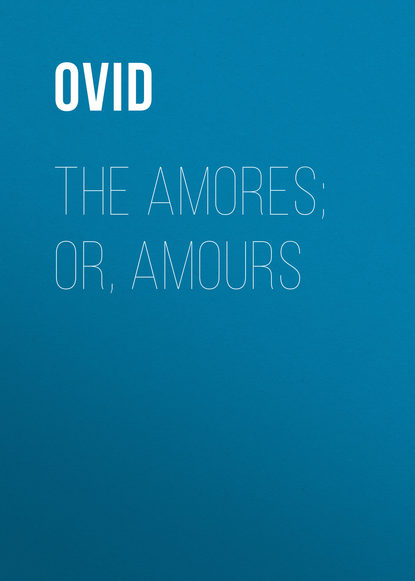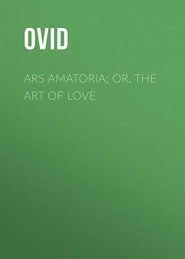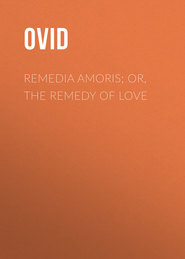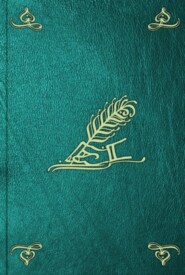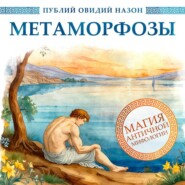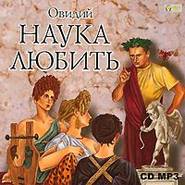По всем вопросам обращайтесь на: info@litportal.ru
(©) 2003-2024.
✖
The Amores; or, Amours
Настройки чтения
Размер шрифта
Высота строк
Поля
[ Vowed to Phobus.—Ver. 34. Sappho says in her Epistle, that if Phaon should refuse to return, she will dedicate her lyre to Phobus, and throw herself from the Leucadian rock. This, he tells her, she may now-do, as by his answer Phaon declines to return.]
485 (return (#x4_x_4_i48))
[ Pain in her head.—Ver. 11. She pretended a head-ache, when nothing wras the matter with her; in order that too much familiarity, in the end, might not breed contempt.]
486 (return (#x4_x_4_i49))
[ A surfeit of love.—Ver. 25. 'l'inguis amor' seems here to mear a satisfied 'ora 'pampered passion;' one that meets with no repulse.]
487 (return (#x4_x_4_i49))
[ Enclosed Danaë.—Ver. 27. See the Metamorphoses, Book iv., 1.]
488 (return (#x4_x_4_i50))
[ The dogs bark.—Ver. 40. The women of loose character, among the Romans, were much in the habit of keeping dogs, for the protection of their houses.]
FOOTNOTES BOOK THREE:
501 (return (#x4_x_4_i57))
[ Than the other.—Ver. 8. 'He alludes to the unequal lines of the Elegiac measure, which consists of Hexameters and Pentameters. In personifying Elegy, he might have omitted this remark, as it does not add to the attractions of a lady, to have one foot longer than the other; he says, however, that it added to her gracefulness.]
502 (return (#x4_x_4_i58))
[ The Lydian buskin.—Ver. 14. As Lydia was said to have sent colonists to Etruria, some Commentators think that the word 'Lydius' here means 'Etrurian and that the first actors at Rome were Etrurians. But, as the Romans derived their notions of tragedy from the Greeks, we may conclude that Lydia in Asia Minor is here referred to; for we learn from Herodotus and other historians, that the Greeks borrowed largely from the Lydians.]
503 (return (#x4_x_4_i58))
[ Drunken revels.—Ver. 17. He probably alludes to the Fourth Elegy of the First, and the Fifth Elegy of the Second Book of the 'Amores.']
505 (return (#x4_x_4_i58))
[ Mighty inspiration.—Ver. 23. The 'thyrsus' was said to have been first used by the troops of Bacchus, in his Indian expedition, when, to deceive the Indians, they concealed the points of their spears amid leaves of the vine and ivy. Similar weapons were used by his devotees when worshipping him, which they brandished to and fro. To be touched with the thyrsus of Bacchus, meant 'to be inspired with poetic frenzy.' See the Notes to the Metamorphoses, Book iii. 1. 542.]
506 (return (#x4_x_4_i59))
[ In unequal numbers.—Ver. 37. Some have supposed, that allusion is made to the Tragedy of Medea, which Ovid had composed, and that it had been written in Elegiac measure. This, however, does not seem to be the meaning of the passage. Elegy justly asks Tragedy, why, if she has such a dislike to Elegiac verses, she has been talking in them? which she has done, from the 15th line to the 30th.]
507 (return (#x4_x_4_i59))
[ Myself the patroness.—Ver. 44. She certainly does not give herself a very high character in giving herself the title of 'lena.']
508 (return (#x4_x_4_i60))
[ The fastened door.—Ver. 50. He alludes, probably, to one of the Elegies which he rejected, when he cut down the five books to three.]
509 (return (#x4_x_4_i60))
[ In a hose tunic.—Ver. 51. He may possibly allude to the Fifth Elegy of the First Book, as the words 'tunicâ velata recinctâ,' as applied to Corinna, are there found. But there he mentions midday as the time when Corinna came to him, whereas he seems here to allude to the middle of the night.]
510 (return (#x4_x_4_i60))
[ Cut in the wood.—Ver. 53. He alludes to the custom of lovers carving inscriptions on the doors of their obdurate mistresses: this we learn from Plautus to have been done in Elegiac strains, and sometimes with charcoal. 'Implentur meæ fores clegiarum carbonibus.' 'My doors are filled with the coal-black marks of elegies.']
511 (return (#x4_x_4_i60))
[ On her birthday.—Ver. 57. She is telling Ovid what she has put up with for his sake; and she reminds him how, when he sent to his mistress some complimentary lines on her birthday, she tore them up and threw them in the water. Horace mentions 'the flames, or the Adriatic sea,' as the end of verses that displeased. Athenseus, Book xiii. c. 5, relates a somewhat similai story. Diphilus the poet was in the habit of sending his verses to his mistress Gnathæna. One day she was mixing him a cup of wine and snow-water, on which he observed, how cold her well must be; to which she answered, yes, for it was there that she used to throw his compositions.]
514 (return (#x4_x_4_i62))
[ From behind.—Ver. 70. It is not known, for certain, to what he refers in this line. Some think that he refers to the succeeding Elegies in this Book, which are, in general, longer than the former ones, while others suppose that he refers to his Metamorphoses, which he then contemplated writing. Burmann, however, is not satisfied with this explanation, and thinks that, in his more mature years, he contemplated the composition of Tragedy, after having devoted his youth to lighter snbjects; and that he did not compose, or even contemplate the composition of his Metamorphoses, until many years afterwards.]
515 (return (#x4_x_4_i66))
[ I am not sitting here.—Ver. 1. He is here alluding to the Circen-sian games, which were celebrating in the Circus Maximus, or greatest Circus, at Rome, at different times in the year. Some account is given of the Circus Maximus in the Note to 1. 392. of the Second Book of the Fasti. The 'Magni,' or Great Circensian games, took place on the Fourth of the Ides of April. The buildings of the Circus were burnt in the conflagration of Rome, in Nero's reign; and it was not restored till the days of Trajan, who rebuilt it with more than its former magnificence, and made it capable, according to some authors, of accommodating 385,000 persons. The Poet says, that he takes no particular interest himself in the race, but hopes that the horse may win which is her favourite.]
516 (return (#x4_x_4_i66))
[ The spirited steeds.—Ver. 2. The usual number of chariots in each race was four. The charioteers were divided into four companies, or 'fac-tiones,' each distinguished by a colour, representing the season of the year. These colours were green for the spring, red for the summer, azure for the autumn, and white for the winter. Originally, but two chariots started in each race; but Domitian increased the number to six, appointing two new companies of charioteers, the golden and the purple; however the number was still, more usually, restricted to four. The greatest interest was shewn by all classes, and by both sexes, in the race. Lists of the horses were circulated, with their names and colours; the names also of the charioteers were given, and bets were extensively made, (see the Art of Love, Book i. 1. 167, 168,) and sometimes disputes and violent contests arose.]
517 (return (#x4_x_4_i66))
[ To be seated by you.—Ver. 3. The men and women sat together when viewing the contests of the Circus, and not in separate parts of the building, as at the theatres.]
518 (return (#x4_x_4_i66))
[ Happy the driver.—Ver. 7. He addresses the charioteer.]
519 (return (#x4_x_4_i66))
[ The sacred barrier.—Ver. 9. For an account of the 'career,' or 'starting-place,' see the Notes to the Tristia, Book v. El. ix. 1. 29. It is called 'sacer,' because the whole of the Circus Maximus was sacred to Consus, who is supposed by some to have been the same Deity as Neptune. The games commenced with sacrifices to the Deities.]
520 (return (#x4_x_4_i66))
[ I would give rein.—Ver. 11. The charioteer was wont to stand within the reins, having them thrown round his back. Leaning backwards, he thereby threw his full weight against the horses, when he wished to check them at full speed. This practice, however, was dangerous, and by it the death of Hippolytus was caused. In the Fifteenth Book of the Metamorphoses,1. 524, he says, 'I struggled, with unavailing hand, to guide the bridle covered with white foam, and throwing myself "backwards, I pulled back the loosened reins.' To avoid the danger of this practice, the charioteer carried a hooked knife at his waist, for the purpose of cutting the reins on an emergency.]
521 (return (#x4_x_4_i66))
[ The turning-place.—Ver. 12. For an account of the 'meta.'see the Tristia, Book iv. El. viii.l. 35. Of course, thpse who kept as close to the 'meta' as possible, would lose the least distance in turning round it.]
522 (return (#x4_x_4_i67))
[ How nearly was Pelops.—Ver. 15. In his race with Onomaüs, king of Pisa, in Arcadia, for the hand of his daughter, Hippodamia, when Pelops conquered his adversary by bribing his charioteer, Myrtilus.]
523 (return (#x4_x_4_i67))
[ Of his mistress.—Ver. 17. He here seems to imply that it was Hippodamia who bribed Myrtilus.]
485 (return (#x4_x_4_i48))
[ Pain in her head.—Ver. 11. She pretended a head-ache, when nothing wras the matter with her; in order that too much familiarity, in the end, might not breed contempt.]
486 (return (#x4_x_4_i49))
[ A surfeit of love.—Ver. 25. 'l'inguis amor' seems here to mear a satisfied 'ora 'pampered passion;' one that meets with no repulse.]
487 (return (#x4_x_4_i49))
[ Enclosed Danaë.—Ver. 27. See the Metamorphoses, Book iv., 1.]
488 (return (#x4_x_4_i50))
[ The dogs bark.—Ver. 40. The women of loose character, among the Romans, were much in the habit of keeping dogs, for the protection of their houses.]
FOOTNOTES BOOK THREE:
501 (return (#x4_x_4_i57))
[ Than the other.—Ver. 8. 'He alludes to the unequal lines of the Elegiac measure, which consists of Hexameters and Pentameters. In personifying Elegy, he might have omitted this remark, as it does not add to the attractions of a lady, to have one foot longer than the other; he says, however, that it added to her gracefulness.]
502 (return (#x4_x_4_i58))
[ The Lydian buskin.—Ver. 14. As Lydia was said to have sent colonists to Etruria, some Commentators think that the word 'Lydius' here means 'Etrurian and that the first actors at Rome were Etrurians. But, as the Romans derived their notions of tragedy from the Greeks, we may conclude that Lydia in Asia Minor is here referred to; for we learn from Herodotus and other historians, that the Greeks borrowed largely from the Lydians.]
503 (return (#x4_x_4_i58))
[ Drunken revels.—Ver. 17. He probably alludes to the Fourth Elegy of the First, and the Fifth Elegy of the Second Book of the 'Amores.']
505 (return (#x4_x_4_i58))
[ Mighty inspiration.—Ver. 23. The 'thyrsus' was said to have been first used by the troops of Bacchus, in his Indian expedition, when, to deceive the Indians, they concealed the points of their spears amid leaves of the vine and ivy. Similar weapons were used by his devotees when worshipping him, which they brandished to and fro. To be touched with the thyrsus of Bacchus, meant 'to be inspired with poetic frenzy.' See the Notes to the Metamorphoses, Book iii. 1. 542.]
506 (return (#x4_x_4_i59))
[ In unequal numbers.—Ver. 37. Some have supposed, that allusion is made to the Tragedy of Medea, which Ovid had composed, and that it had been written in Elegiac measure. This, however, does not seem to be the meaning of the passage. Elegy justly asks Tragedy, why, if she has such a dislike to Elegiac verses, she has been talking in them? which she has done, from the 15th line to the 30th.]
507 (return (#x4_x_4_i59))
[ Myself the patroness.—Ver. 44. She certainly does not give herself a very high character in giving herself the title of 'lena.']
508 (return (#x4_x_4_i60))
[ The fastened door.—Ver. 50. He alludes, probably, to one of the Elegies which he rejected, when he cut down the five books to three.]
509 (return (#x4_x_4_i60))
[ In a hose tunic.—Ver. 51. He may possibly allude to the Fifth Elegy of the First Book, as the words 'tunicâ velata recinctâ,' as applied to Corinna, are there found. But there he mentions midday as the time when Corinna came to him, whereas he seems here to allude to the middle of the night.]
510 (return (#x4_x_4_i60))
[ Cut in the wood.—Ver. 53. He alludes to the custom of lovers carving inscriptions on the doors of their obdurate mistresses: this we learn from Plautus to have been done in Elegiac strains, and sometimes with charcoal. 'Implentur meæ fores clegiarum carbonibus.' 'My doors are filled with the coal-black marks of elegies.']
511 (return (#x4_x_4_i60))
[ On her birthday.—Ver. 57. She is telling Ovid what she has put up with for his sake; and she reminds him how, when he sent to his mistress some complimentary lines on her birthday, she tore them up and threw them in the water. Horace mentions 'the flames, or the Adriatic sea,' as the end of verses that displeased. Athenseus, Book xiii. c. 5, relates a somewhat similai story. Diphilus the poet was in the habit of sending his verses to his mistress Gnathæna. One day she was mixing him a cup of wine and snow-water, on which he observed, how cold her well must be; to which she answered, yes, for it was there that she used to throw his compositions.]
514 (return (#x4_x_4_i62))
[ From behind.—Ver. 70. It is not known, for certain, to what he refers in this line. Some think that he refers to the succeeding Elegies in this Book, which are, in general, longer than the former ones, while others suppose that he refers to his Metamorphoses, which he then contemplated writing. Burmann, however, is not satisfied with this explanation, and thinks that, in his more mature years, he contemplated the composition of Tragedy, after having devoted his youth to lighter snbjects; and that he did not compose, or even contemplate the composition of his Metamorphoses, until many years afterwards.]
515 (return (#x4_x_4_i66))
[ I am not sitting here.—Ver. 1. He is here alluding to the Circen-sian games, which were celebrating in the Circus Maximus, or greatest Circus, at Rome, at different times in the year. Some account is given of the Circus Maximus in the Note to 1. 392. of the Second Book of the Fasti. The 'Magni,' or Great Circensian games, took place on the Fourth of the Ides of April. The buildings of the Circus were burnt in the conflagration of Rome, in Nero's reign; and it was not restored till the days of Trajan, who rebuilt it with more than its former magnificence, and made it capable, according to some authors, of accommodating 385,000 persons. The Poet says, that he takes no particular interest himself in the race, but hopes that the horse may win which is her favourite.]
516 (return (#x4_x_4_i66))
[ The spirited steeds.—Ver. 2. The usual number of chariots in each race was four. The charioteers were divided into four companies, or 'fac-tiones,' each distinguished by a colour, representing the season of the year. These colours were green for the spring, red for the summer, azure for the autumn, and white for the winter. Originally, but two chariots started in each race; but Domitian increased the number to six, appointing two new companies of charioteers, the golden and the purple; however the number was still, more usually, restricted to four. The greatest interest was shewn by all classes, and by both sexes, in the race. Lists of the horses were circulated, with their names and colours; the names also of the charioteers were given, and bets were extensively made, (see the Art of Love, Book i. 1. 167, 168,) and sometimes disputes and violent contests arose.]
517 (return (#x4_x_4_i66))
[ To be seated by you.—Ver. 3. The men and women sat together when viewing the contests of the Circus, and not in separate parts of the building, as at the theatres.]
518 (return (#x4_x_4_i66))
[ Happy the driver.—Ver. 7. He addresses the charioteer.]
519 (return (#x4_x_4_i66))
[ The sacred barrier.—Ver. 9. For an account of the 'career,' or 'starting-place,' see the Notes to the Tristia, Book v. El. ix. 1. 29. It is called 'sacer,' because the whole of the Circus Maximus was sacred to Consus, who is supposed by some to have been the same Deity as Neptune. The games commenced with sacrifices to the Deities.]
520 (return (#x4_x_4_i66))
[ I would give rein.—Ver. 11. The charioteer was wont to stand within the reins, having them thrown round his back. Leaning backwards, he thereby threw his full weight against the horses, when he wished to check them at full speed. This practice, however, was dangerous, and by it the death of Hippolytus was caused. In the Fifteenth Book of the Metamorphoses,1. 524, he says, 'I struggled, with unavailing hand, to guide the bridle covered with white foam, and throwing myself "backwards, I pulled back the loosened reins.' To avoid the danger of this practice, the charioteer carried a hooked knife at his waist, for the purpose of cutting the reins on an emergency.]
521 (return (#x4_x_4_i66))
[ The turning-place.—Ver. 12. For an account of the 'meta.'see the Tristia, Book iv. El. viii.l. 35. Of course, thpse who kept as close to the 'meta' as possible, would lose the least distance in turning round it.]
522 (return (#x4_x_4_i67))
[ How nearly was Pelops.—Ver. 15. In his race with Onomaüs, king of Pisa, in Arcadia, for the hand of his daughter, Hippodamia, when Pelops conquered his adversary by bribing his charioteer, Myrtilus.]
523 (return (#x4_x_4_i67))
[ Of his mistress.—Ver. 17. He here seems to imply that it was Hippodamia who bribed Myrtilus.]





